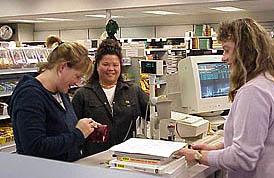How are you today? Did you find everything you were looking for? Are you a member of our frequent buyers' program? Would you like to join? Could you tell me your ZIP code, please?  The POS script is a longstanding tradition in bricks-and-mortar retail stores. Lately the cashiers at my local supermarket seem to have been commanded to say something nice about precisely one item per customer ("Oh, that's my favorite coffee, too!").
The POS script is a longstanding tradition in bricks-and-mortar retail stores. Lately the cashiers at my local supermarket seem to have been commanded to say something nice about precisely one item per customer ("Oh, that's my favorite coffee, too!").
When my days on the bookstore sales floor ended a few years ago, I was sure that I would stop thinking about POS scripts, but I haven't. If anything, I'm hyper-aware of them as a customer because I know what it's like on the other side of the counter, where you have to ask the same question(s) again and again.
Those memories, along with an unpleasant shopping experience recently, have ramped up my interest in POS scripts considerably. To help me exorcise this demon, I'd like to pose a few questions to you booksellers out there:
- Does your bookshop use a POS script?
- If not, why not?
- If you do, what does it require cashiers to say?
- What do you like and/or hate about POS scripts?
- How has your script changed over the years?
- What chaos might ensue were you to go scriptless?
A couple of years ago, SmartMoney shared an anecdote about a cashier for a chain bookstore in Manhattan who was tired of the "elaborate scripts" she had to recite during each transaction:
Questions arise. How long did she last? Where is she now? Did this store close during the past year?
A minimal POS script is probably unavoidable. If the customer is a member of the shop's frequent buyer program, for example, the cashier does need to know this. But it's the add-ons (ZIP code collection, programmed talking points) that can make the difference between friendly, efficient interaction and just another cold transaction. All the best handselling in the world can be undone by a bad POS experience.
While I always understood the necessity of organizing (though not micromanaging) the POS exchange, I was never good at POS line readings in two retail environments that captured a significant portion of my working life--the supermarket and the bookshop.
As a customer, I find indie bookstore POS scripts generally less irritating than chain bookstore scripts, if measured on a sliding scale that puts department store scripts at the hellish extreme.
Oh, the unpleasant shopping experience I mentioned above? POS script ghosts came back to haunt me recently while paying for purchases in a department store that shall remain nameless (let's call it "Sears"). A pleasant woman greeted me at the checkout counter and asked whether I was in their discount program (no); asked if I would like to apply for a Sears credit card (no); asked again if I was sure I didn't want to apply for the card (no); rang up my order and, when handing me my receipt, talked about something I should do with information on the back (I'm still not certain what that was about). Finally, after I had signed the electronic credit card screen display, another window popped up with a multiple-choice question about my shopping experience, which I had to answer immediately in front of the sales clerk. I was essentially, and instantly, evaluating her.
I felt far more sorry for the cashier than myself because I would soon be escaping to the sunlight. But the real downside for "Sears" is that the next time I need a shirt, I will recall being trapped in a seemingly endless transaction. It may influence my decision to return, which is one way, I suspect, that many online shoppers are born.
Thankfully, I've never had an equivalent bookshop horror story. One possible conclusion to draw would be that great booksellers make the final, crucial interaction between bookstore and reader a pleasant, profitable one, with or without a script. I don't think it's quite that simple. And unfortunately, the best booksellers aren't always stationed at POS.
Now I'm starting to sound like a retail consultant, but I'm really just a guy who's been wondering about POS scripts in indie bookstores. Will that be all? Have a nice day.--Robert Gray (column archives available at Fresh Eyes Now)

